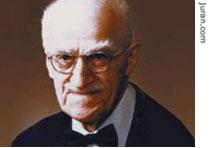VOA慢速英语 2008 0523a(在线收听)
Economics Report - Joseph Juran, 1904-2008: A Life of Quality Control
22 May 2008
This is the VOA Special English Economics Report.
Recently the business world lost a leader in quality control. Joseph Juran died at the age of one hundred and three. He developed ideas that are still important today to improving the quality of products.
 |
| Joseph Juran |
Joseph Juran was born in Braila, Romania. His family came to the United States in nineteen twelve when he was eight. They settled in Minneapolis, Minnesota.
He studied electrical engineering at the University of Minnesota. He was also the school champion at the game of chess. After college, the Western Electric Company put him to work on mathematical methods of quality control.
He became interested in the idea he termed "vital few and trivial many." This idea is popularly known as the "eighty-twenty rule." It could mean, for example, that eighty percent of manufacturing problems result from twenty percent of the causes.
He named it the "Pareto principle," for the Italian economist Vilfredo Pareto. A century ago, Pareto observed that eighty percent of the wealth in Italy went to twenty percent of the population.
But Joseph Juran came to recognize that he had misnamed this principle. He knew that unequal distribution had long been observed in other areas, not just wealth. Yet he gave Pareto credit for identifying it as "universal" when, it seemed, he could have taken the credit himself. He could have called it, he said, the Juran principle.
In nineteen fifty-one, he published his "Quality Control Handbook." This influential book especially interested the Japanese. He was invited to teach in Japan, and he advised some of its largest companies. The Japanese also had help from another American, William Edwards Deming. The two experts helped Japan became a world leader in quality control.
In nineteen sixty-four Joseph Juran published "Managerial Breakthrough." This book formed the basis of several other strategies to reduce manufacturing mistakes and cut waste. Among them are the methods known as Six Sigma and lean management.
In nineteen seventy-nine, Joseph Juran established the Juran Institute in Connecticut. It works with organizations that want to improve quality. But the main purpose of the institute, he said, is to improve society.
Joseph Juran died on February twenty-eighth in Rye, New York. That was where he lived with Sadie Juran, his wife of eighty-one years.
And that's the VOA Special English Economics Report, written by Mario Ritter. I'm Steve Ember.